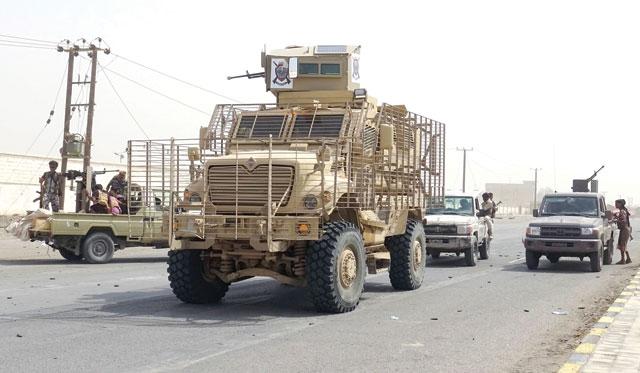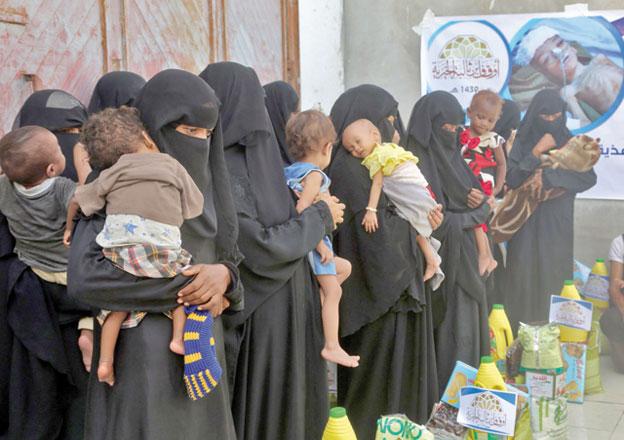You are here
150 killed in battle for Yemen's Hodeida as global alarm grows
By AFP - Nov 12,2018 - Last updated at Nov 12,2018

Yemeni pro-government forces gather on the eastern outskirts of Hodeida, as they continue to battle for the control of the city from Houthi rebels on November 9 (AFP photo)
HODEIDA, Yemen — At least 150 people have been killed in 24 hours of clashes in the Yemeni port city of Hodeida, medics said on Monday, as Britain's top diplomat visited Riyadh seeking to boost international calls for a ceasefire.
Government loyalists supported by a Saudi-led coalition are fighting to oust the Iran-backed Houthi rebels from the strategic Red Sea city, whose docks are a lifeline to 14 million Yemenis at risk of starvation.
Asked about the possibility of a ceasefire, a coalition spokesman told reporters in Riyadh that "the operation is still ongoing", adding that it was meant to pressure the rebels to come to the negotiating table.
A Hodeida resident reported an ebb in fighting around the city by Monday evening, but UN Secretary General Antonio Guterres warned of a possible "catastrophic situation" if the port is destroyed.
"The fighting must stop, a political debate must begin, and we must prepare a massive humanitarian response to avoid the worst next year," he said.
A military source in the pro-government coalition said the insurgents had pushed back a large-scale assault aimed at moving towards the port, under rebel control since 2014.
In a statement sent via the Telegram messaging app, the Houthis said they had "lured" loyalists up the western coastline of Hodeida, where the rebels then launched an attack on the troops.
Government forces, led on the ground by Emirati-backed troops, have made their way into Hodeida after 11 days of clashes, reaching residential neighbourhoods in the east on Sunday and sparking fears of street fights that would further endanger civilians trapped in the city.
Residents and government military sources have reported rebel snipers stationed on rooftops in civilian streets in eastern Hodeida, a few kilometres from the port on the western edge of the city.
Mariam Aldogani, Save the Children's field coordinator in Yemen, said that the people in Hodeida are living in a "state of fear".
"There is ongoing fighting, and the situation is very bad," she told AFP over the weekend by phone, as strikes were heard in the background.
Enough is enough
The Hodeida offensive has sparked international outcry unprecedented in nearly four years of conflict between the Houthis and the Saudi-backed government.
Britain, the United States and France have all called for a cessation to the hostilities. All three countries are major suppliers of arms to Saudi Arabia.
US Secretary of State Mike Pompeo has urged Saudi Crown Prince Mohammed Bin Salman, a major ally of Washington, to engage in peace talks.
British Foreign Secretary Jeremy Hunt met with Saudi King Salman on Monday during a visit to the kingdom to press its rulers to support UN efforts to end the conflict.
Hunt will also meet senior officials from Yemen and the crown prince of the United Arab Emirates, a key pillar of the Saudi-led coalition supporting the Yemeni government, this week.
In France, Foreign Minister Jean-Yves Le Drian said it was time "the international community said enough is enough”.
"There will be no victor in this war," Le Drian told France 2 TV.
Civilian toll
Aid groups fear for the safety of hundreds of thousands of people living in Hodeida — and for millions of others dependent on its port for what little food and humanitarian aid trickle into impoverished, blockaded Yemen.
A military official in Hodeida on Monday confirmed seven civilians had died, without giving further details.
A 15-year-old boy died last week of shrapnel wounds in Hodeida, Save the Children said.
Medics in hospitals across Hodeida province reported 111 rebels and 32 loyalist fighters killed overnight, according to a tally by AFP.
Sources at the Al Alfi military hospital, seized by the rebels during their 2014 takeover, said charred body parts had been delivered there overnight. Military sources confirmed that the Saudi-led alliance had targeted the rebels with multiple air strikes.
The rebels have begun to evacuate their wounded to Sanaa, the capital, which the Houthis seized during a 2014 takeover that included a string of ports on Yemen's coastline.
Saudi Arabia and its allies intervened in the Yemeni government's fight against the Houthis in 2015, triggering what the UN now calls the world's worst humanitarian crisis.
Nearly 600 people have been killed since clashes erupted in Hodeida on November 1, ending a temporary suspension in a government offensive to take the city that began in June.
Diplomatic pressure
The coalition has come under intense international pressure to end the conflict, particularly following the killing of Saudi journalist Jamal Khashoggi, an ardent critic of Prince Mohammed, in his country's consulate in Istanbul on October 2.
Multiple countries, including Germany and Norway, have announced the suspension of arms sales to Saudi Arabia after Khashoggi's killing.
The United Nations' Yemen envoy, Martin Griffiths, is pushing for peace talks between the Houthis and the government by the end of the year.
The United States, which for years provided military training and aerial refuelling for the Saudi-led coalition, on Saturday announced it would end its in-flight refuelling support for the alliance.
The alliance accuses Iran of smuggling arms to the Houthis through Hodeida Port. Tehran denies the charges.
The World Health Organisation estimates nearly 10,000 people have been killed in the Yemen war since 2015. But rights groups believe the toll may be five times as high.
Related Articles
HODEIDA, Yemen — Saudi-led coalition air strikes reportedly killed eight Yemeni Houthi rebels near the port of Hodeida on Monday, triggering
HODEIDA, Yemen — A Houthi rebel advance near Yemen's lifeline port of Hodeida and a Saudi pullback have displaced more than 6,000 people, th
KHOKHA, Yemen — The battle for a major rebel-controlled port in Yemen has left more than 100 soldiers and insurgents dead in less than a wee


















